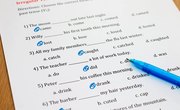You may find grammar and punctuation very confusing. However, it is possible to improve your writing by learning just a few rules.
Use Complete Sentences
A complete sentence contains: a subject (the noun that is doing something), a verb (what it's doing) and a complete thought.
Incorrect: When I go to the store.
"I" is the subject, and "go" is the verb, but the word "when" makes it an incomplete thought.
Correct: I went to the store.
Using Personal Pronouns Correctly
One common mistake is to use "I" and "me" incorrectly. Use "I" when it is doing something in the sentence as the subject. Use "me" when it isn't doing something or isn't the subject. Example 1: I am walking. Example 2: You are walking with me.
Pronouns with "And"
When using pronouns with "and," mentally eliminate the non-pronoun to avoid an error. For instance, when trying to decide to use "they" or "them" in example 1, eliminate "Josh and." Example 1: Josh and they are going. When trying to decide to use "I" or "me" in example 2, eliminate "and Bob." Example 2: Give those to me and Bob.
Punctuate Compound Sentences Correctly
If you link together two complete thoughts with a coordinating conjunction, place a comma before the coordinating conjunction. Example: You would like to write a cover letter, but you want to learn some punctuation first. The coordinating conjunctions are "for," "and," "nor," "but," "or," "yet" and "so." You might remember the conjunctions using the anagram FANBOYS.
Warning
Don't randomly place a comma any time you use a coordinating conjunction. The conjunction has to be connecting two main thoughts. Incorrect: Suzy wrote the book, and sent it to the publisher. Correct: Suzy wrote the book, and Bob sent it to the publisher.
Related Articles
References
- Warriner's English Grammar and Composition, Liberty Edition, Fourth Course; John E. Warriner; 1986
Writer Bio
Carrie Allison-Rolling has been writing and working with young writers for 15 years. She earned a B.A. in English and a B.S.Ed. in English education from Northwest Missouri State University and a master's in English at the University of Missouri. Her poetry chapbook was publish by Mid-America Press. She now is a stay-at-home mother.










